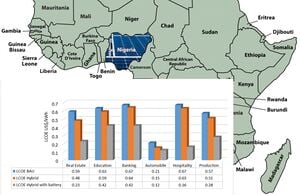
It is well established that lack of both electric supply capacity and reliability weaken the Nigerian economy. Recently, the reduction in solar photovoltaic (PV) costs along with the technical potential to couple PV to hybrid battery and diesel generators provides Nigerian businesses with an opportunity to reduce operating costs while defecting from the grid. This study investigates the potential of using off-grid hybrid energy systems for private industries within and near Lagos state currently with relatively high daily electricity demands that are met with supply through captive diesel generation. The results based on simulations of six industry sector load profiles developed from surveys found solar PV and diesel hybrid energy systems are economically viable for a wide array of industries in the Nigerian private sector including real estate, education, banking, automobile, hospitality and production. Five of the six sectors had discounted payback times for the systems under a year and ROIs >100%. The results established that the levelized cost of electricity is lower for every sector analysed with inclusion of solar PV, lower still with coupling of batteries and more reliable than the current grid-provided electricity. Nigeria as a whole will also benefit from widespread adoption of solar hybrid systems, as it will assist the balance of trade by reducing refined petroleum imports. In conclusion, the results of this study make it clear that every scale of Nigerian businesses could increase profitability with the use of solar hybrid systems.
See also[edit | edit source]
- A Free and open-source microgrid optimization tool: SAMA the Solar Alone Multi-Objective Advisor
- Demonstration of the integrated rural energy planning framework for sustainable energy development in low-income countries: Case studies of rural communities in Nigeria
- Low emissions analysis platform model for renewable energy: Community-scale case studies in Nigeria
- Decentralized Renewable Hybrid Mini-Grids for Rural Communities: Culmination of the IREP Framework and Scale up to Urban Communities
- Levelized cost of electricity for solar photovoltaic, battery and cogen hybrid systems
- Performance of U.S. hybrid distributed energy systems: Solar photovoltaic, battery and combined heat and power
- Emerging economic viability of grid defection in a northern climate using solar hybrid systems
- The Potential for Grid Defection of Small and Medium Sized Enterprises Using Solar Photovoltaic, Battery and Generator Hybrid Systems
- Review of solar levelized cost
- PV and CHP Hybrid System
- Hybrid photovoltaic-trigeneration systems
- Simulations of Greenhouse Gas Emission Reductions from Low-Cost Hybrid Solar Photovoltaic and Cogeneration Systems for New Communities
- Emerging economic viability of grid defection in a northern climate using solar hybrid systems
- Photovoltaic plus combined heat and power
- Achieving 100% Renewable and Self-Sufficient Electricity in Impoverished, Rural, Northern Climates: Case Studies from Upper Michigan, USA
- Adapting the European typology approach for building stock energy assessment (TABULA) concept for the developing world: The Nigerian case study





